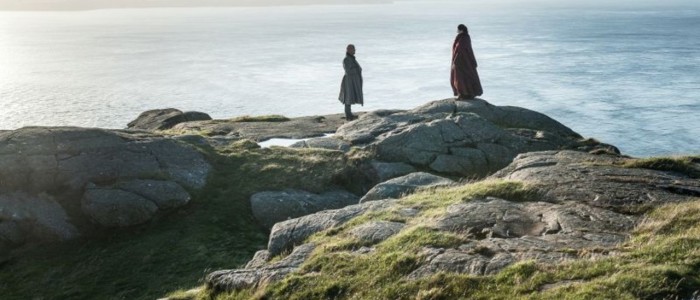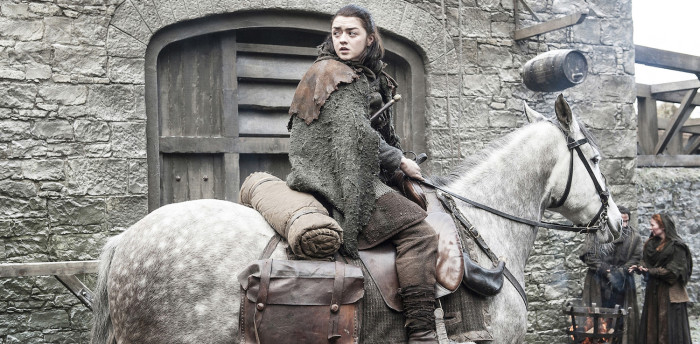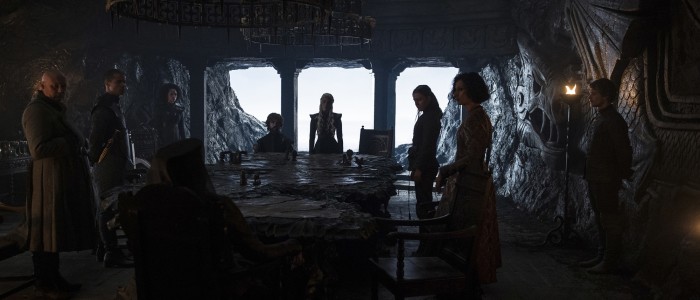'Game Of Thrones' Is Moving Much Faster Now, But Is That A Good Thing?
For its first six seasons, HBO's Game of Thrones was a slow-paced show that took its time moving pieces into place. Those first four episodes or so were all build-up, all simmer. And then things would finally take off, propelling you into a final stretch where everything paid off with a bloody bang. We all got used to it.
This has changed in season 7, where the endgame is in sight and the surviving kings and queens are engaged in the war we've been promised since the very beginning. Now, things happen fast on Game of Thrones. People get places quickly. Major revelations happen every other scene. The uphill climb isn't just reduced – it's gone entirely. And we have mixed feelings on this.
/Film writers Jacob Hall and Ben Pearson sat down to talk about the pace of the new season and whether or not Game of Thrones is still Game of Thrones without its signature pacing...and whether or not the show's world-building is suffering for it.
 Jacob: Let's start with everyone's favorite subject: numbers! In interviews, author George R.R. Martin has said that Westeros is about the size of South America. That's approximately 6,879,000 square miles. That's about 2,705 miles from King's Landing to Casterly Rock. That's 4,443 miles from The Wall to Dorne. And the early seasons do a pretty good job of representing this distance. It took Robert Baratheon and his caravan many weeks to reach Winterfell from King's Landing, represented by the Stark kids' direwolf pups growing up. Later in the season, it took Tyrion and Bronn several episodes to trek from the Eyrie to King's Landing, keeping the show's most popular character almost entirely off screen just to sell the idea of distance. Being a Game of Thrones fan means having a basic understanding of geography, of scope, of size, of where everything is. And this size has contributed to the show's infamous pace – it takes its sweet time getting to where it needs to go, promising a worthy pay-off in the end.
Jacob: Let's start with everyone's favorite subject: numbers! In interviews, author George R.R. Martin has said that Westeros is about the size of South America. That's approximately 6,879,000 square miles. That's about 2,705 miles from King's Landing to Casterly Rock. That's 4,443 miles from The Wall to Dorne. And the early seasons do a pretty good job of representing this distance. It took Robert Baratheon and his caravan many weeks to reach Winterfell from King's Landing, represented by the Stark kids' direwolf pups growing up. Later in the season, it took Tyrion and Bronn several episodes to trek from the Eyrie to King's Landing, keeping the show's most popular character almost entirely off screen just to sell the idea of distance. Being a Game of Thrones fan means having a basic understanding of geography, of scope, of size, of where everything is. And this size has contributed to the show's infamous pace – it takes its sweet time getting to where it needs to go, promising a worthy pay-off in the end.
And even when the show started playing fast and loose with travel time in other seasons, this pace was mostly maintained. Melisandre could teleport around the continent for the sake of plot convenience, but the show was still deliberate. Its gears moved slowly. But season 7, with its shortened episode count and quickly approaching endgame, feels different. And you were telling me that this isn't quite sitting well with you. Do you feel like the show has lost something by sprinting when it used to take its sweet time?
Ben: I want to be clear from the start: I still love the show, and as someone who has occasionally grown a little restless with its deliberate pacing in previous seasons, the idea that IT'S ALL FINALLY HAPPENING is making for intriguing and propulsive television right now. But I can't help but shake the feeling that showrunners David Benioff and D.B. Weiss suddenly looked at how much time they've allotted for the remaining episodes in this series, did a double take, and said, "Wait, we only have that many hours to tell all of this story? We've gotta get moving!"
As you indicated, the show has previously manipulated time before, showing us different lengths of time happening across different plot lines, all cut together in a single episode. But what we've seen so far in season 7 puts all of that to shame: more people are traveling vast distances in a single episode, and it seems as if no significant amount of time has passed. For a series that features a sprawling map under its opening credits to establish where everyone is in relation to each other, it certainly feels like it has abandoned its previous dedication to making sure we feel the vastness of Westeros. So to answer your question, yes, I do feel like it's lost something by sprinting. It's lost a bit of its meticulous nature, and a bit of its realism along the way.
What do you make of the show's drastic change in pace?
 Jacob: I wrote about this in my review of the most recent episode, but I think it's a bit of a double-edged (Valyrian Steel?) sword. On one level, it's fun to watch the dominoes come tumbling down. But on the other, I can't help but miss watching the process of those dominoes being assembled in the first place. I feel like we're now watching a chess game where the players are hitting the chess clock as fast as possible instead of taking measure of the board, stroking their beard, and thinking thoughtfully. Yeah, a speedy chess game between masters is a blast to watch because watching smart people act quickly is fun, but there's something to said about getting lost in the gaze between two opponents, of sitting in a room thick with tension and just waaaaaaaaaiting for someone to draw a blade and cut it. Game of Thrones season 7 has been fun and exciting and and propulsive, but I don't think it's been tense in the way it has been in previous seasons.
Jacob: I wrote about this in my review of the most recent episode, but I think it's a bit of a double-edged (Valyrian Steel?) sword. On one level, it's fun to watch the dominoes come tumbling down. But on the other, I can't help but miss watching the process of those dominoes being assembled in the first place. I feel like we're now watching a chess game where the players are hitting the chess clock as fast as possible instead of taking measure of the board, stroking their beard, and thinking thoughtfully. Yeah, a speedy chess game between masters is a blast to watch because watching smart people act quickly is fun, but there's something to said about getting lost in the gaze between two opponents, of sitting in a room thick with tension and just waaaaaaaaaiting for someone to draw a blade and cut it. Game of Thrones season 7 has been fun and exciting and and propulsive, but I don't think it's been tense in the way it has been in previous seasons.
And yet! I'm not sure if it's lost something as much as it has replaced something. Game of Thrones is a booby trapped room where the walls are closing in. And for six seasons, everyone has been talking about how they've been living in a booby trapped room where the walls were going to start closing in. And lo and behold, the walls have started closing in and these characters are being pushed together faster than even they were expecting and all they can do to survive is lash out and take down whoever is within reach. Game of Thrones started off as a sprawling, slow show and it has shrunk into a scrappy, more focused show about top-tier players in one final battle royale. There's a fascination to be found there, don't you think? It doesn't supply that satisfying slow burn, but it is providing the extended freight train of pure climax we were promised so many years ago.
Ben: Totally. I appreciate the way the show took its time to build up stores of potential energy that it's now rapidly turning into kinetic energy, but my biggest frustration is the inconsistency with which people and information are moving throughout the world this season.
Take Bran, for instance. As soon as Bran and Meera showed up at the Wall, Dolorous Edd (the current Lord Commander of the Night's Watch) would have instantly dispatched a raven to Winterfell to tell Jon that Bran had arrived. But the show couldn't have that reunion happen quickly (because Jon had to head for Dragonstone in order to keep the narrative momentum churning), so there ends up being no raven at all – Bran just shows up a couple episodes later, after Jon had already left. It's a decision that sacrifices Edd's intelligence in favor of plotting. In the meantime, ravens flew all across the seven kingdoms: from Tyrion at Dragonstone summoning Jon at Winterfell, and from Cersei's spies to King's Landing.
The show's previously well-established internal logic seems to be taking a backseat to pushing the story forward. I like the action, the spectacle, and all of the maneuvering on the chess board, but I admit I miss the days when the show valued its own rules.
 Jacob: I feel like we're circling the big geek argument. It applies to movies, television, comics, video games, and just about every other entertainment medium that values world-building. Hell, I've seen it come up during a Dungeons & Dragons campaign. What's more important: crafting a moment or steadfastly adhering to the established rules of a fictional land?
Jacob: I feel like we're circling the big geek argument. It applies to movies, television, comics, video games, and just about every other entertainment medium that values world-building. Hell, I've seen it come up during a Dungeons & Dragons campaign. What's more important: crafting a moment or steadfastly adhering to the established rules of a fictional land?
Because you're right. The Night's Watch should have sent a raven. If these events had happened in the pages of Martin's work (and we're so far beyond the books at this point), that's what would have happened. That's a literary choice. But Bran showing up at Winterfell and Sansa being able to see her little brother in-person for the first time since episode two is a moment that values pure emotion over logic. It's a cinematic choice. And damn it all, it's a cinematic choice that I wanted to see! If Game of Thrones is operating on fast-forward now (maybe 1.5x speed?), the very least it can do is nail the emotional quality of a scene if it has to sacrifice certain rules.
At the same time, your frustration is understandable. As someone who has devoured the novels and the World of Ice and Fire companion book and has spent far too much time immersed in this world, I can speak to the details mattering. They matter to me. They matter to me in ways that the real world does not! However, I'm wondering what kind of show I want in the homestretch here – one that plays by the rules or one that delivers the emotional epiphanies these characters deserve. Will Benioff and Weiss fudge a few dice rolls to ensure that the players have a more dynamic conclusion? It seems that way. Should that be allowed? As I said: the ultimate big geeky question.
I'm wondering if you think the show could strike a better balance between following its own internal logic and nailing these reunions and emotional beats in the cinematic way they deserve. Do you think a 10-episode season would have served them better? I think I'm enjoying the breakneck pace more than you, but I also feel like I may be more willing to forgive logical lapses in favor of emotional denouements (or shocking reveals, like the Lannister army having somehow teleported across Westeros) that hit me right in the heart or gut. Am I being a chump?
Ben: No, you're not being a chump. I think I'm just having more trouble than I should separating the worlds of the show and Martin's densely-packed novels. But in my defense, the reason for that trouble is because Benioff and Weiss did such a fantastic job of translating Martin's vivid worlds and back-stabbing politics to the small screen in earlier seasons, so I feel like I'm justified in wanting to hold them to a high standard of consistency throughout.
I feel the power of those emotional moments you mentioned, and I think maybe the only suggestion I'd have (which they obviously can't implement now, even on the off chance that anyone involved with writing the show happened to be reading this) would be to try to subtly address how much time has passed in between ravens, battles, or long trips. I think I'd be much more okay with the show's overall pacing ramping up if, for example, Tyrion were to drop a line to Jon about how he's surprised it only took Jon two weeks to arrive from Winterfell. If we found out all the ravens at Castle Black died, it might make for a clunky moment, but at least that would be addressing the logic leap the showrunners are asking us to make. I realize that's a terrible idea, by the way. Man, writing for a TV show writing is harder than I thought!
Ultimately, this is a "me" problem, something I'm just going to have to come to terms with in the understanding that television is a wildly different medium than a novel and that TV audiences have become conditioned to expect things at a different pace than book readers. As long as Game of Thrones continues to make its emotional moments resonate and doesn't sacrifice character motivations in order to advance the plot, it'll continue to be one of my favorite television shows ever. Here's hoping Benioff and Weiss craft that dynamic conclusion you were talking about, and I look forward to seeing what happens in the rest of season 7.
